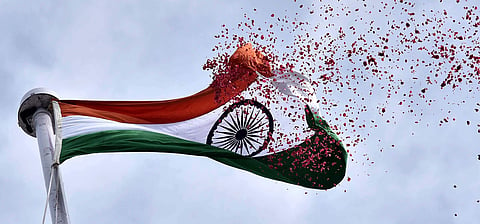

CHENNAI: Cutting a cake depicting the national flag with an Ashok Chakra design at the centre is not unpatriotic or an 'insult' under the Prevention of Insults to National Honour Act, 1971, the Madras High Court ruled on Monday.
A single member bench of Justice N Anand Venkatesh passed the directions by quashing all the criminal proceedings initiated by the trial court in the incident that dates back to 2013.
The issue pertains to the Christmas day celebration on December 25, 2013, where a cake measuring 6 feet in length and 5 feet in breadth, the icing on which carried a tricolour with Indian map outline and Ashok Chakra in the centre, was cut, distributed and consumed by the special guests and about 2,500 participants including 1000 children. The Coimbatore District Collector and a DCP also took part in the celebration.
D Senthilkumar of the Hindu Public Party filed a complaint alleging that the cake's design was a representation of the Indian national flag and that the act of cutting it amounted to an offence under Section 2 of the Prevention of Insults to National Honour Act, 1971.
The state government challenged the entire criminal proceedings initiated by the order of the trial court magistrate that included public servants and that there were procedural irregularities involved in the magistrate's direction to register an FIR in the matter.
Justice Anand Venkatesh in his order emphasised patriotism by observing, "There is no doubt that nationalism in a democracy like India is very vital. But, hyper and surfeit of adherence to it goes against the prosperity of our nation from all its past glory... A patriot is not one who only raises the flag, symbolises his national pride and wears it on his sleeve, but also, a person who bats for good governance. The symbolisation of national pride is not synonymous with patriotism, just like how cutting a cake is not unpatriotic."
The court also brought out the words of Rabindranath Tagore: “Patriotism cannot be our final spiritual shelter; my refuge is humanity. I will not buy glass for the price of diamonds, and I will never allow patriotism to triumph over humanity as long as I live.”
Explaining the lapses of the trial court magistrate, the court said "The procedure followed by the learned magistrate is patently illegal. Power to direct investigation under Section 156(3), Cr.P.C. is done at the pre-cognisance stage. Therefore, once the magistrate decides to take cognisance and embarks upon the procedure stipulated under Chapter XV, Cr.P.C., he cannot revert back to the pre-cognisance stage and pass orders under Section 156(3), Cr.P.C."
The court observed that merely attending the event will not bring down the pride of the national flag. "Will they be feeling great pride in belonging to this great nation, or would the pride of India have come down on the mere cutting of a cake during the celebration? Without any hesitation, this court can hold that the participants would have felt only the former and not the latter," the judge said.
For proper understanding, the judge cited a hypothetical case where there is widespread participation in an Independence Day or Republic Day celebration. During such celebrations, the participants are provided with a national flag to be worn by them. In reality, after the participants leave the venue on completion of the celebrations, they do not continue to possess this flag forever and it becomes part of any other waste paper. Will this mean that each of the participants has insulted the national flag and should be proceeded against under Section 2 of the Act? The obvious answer is in the negative, he said.
Quashing the criminal proceedings, the court observed, "The Flag Code does provide a mechanism to destroy flags in private, in a manner consistent with the dignity of the flag, and as a responsible citizen, it should be followed in letter and spirit. Not all will be aware of this procedure, and therefore, that by itself will not make them susceptible to committing an offence under Section 2 of the Act."
The court said a "wayfarer" should not expose persons to criminal proceedings for innocuous acts.